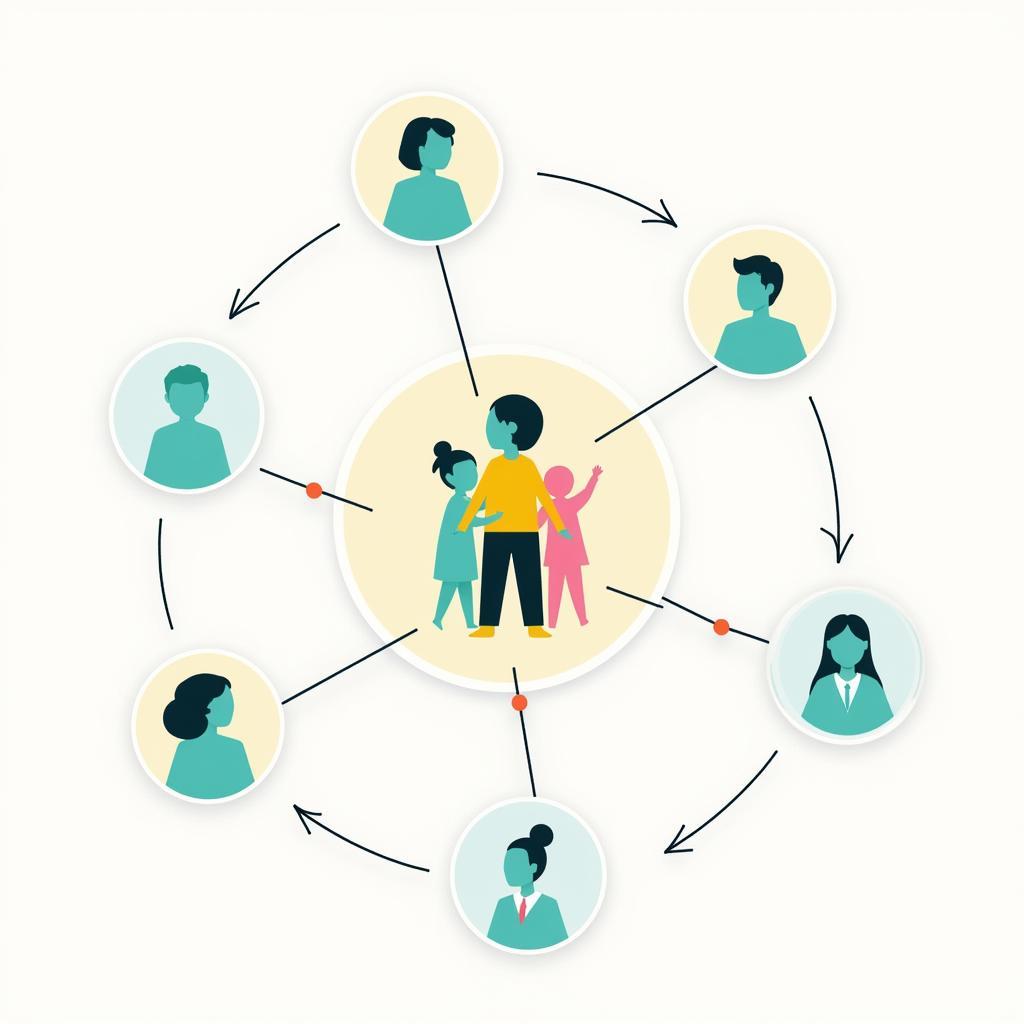What Does Foster Care With Services Mean?
When you hear the phrase “foster care with services,” it might seem a bit redundant. Isn’t foster care inherently about providing care and services to children who need it most? While true, the addition of “with services” emphasizes a critical aspect of the foster care system. It highlights the comprehensive support network designed not only to meet a child’s basic needs but also to address the underlying issues that led to their placement in foster care.
 Support network diagram for foster children
Support network diagram for foster children
Understanding the Needs Addressed by “Services”
“Services” in the context of foster care encompass a broad spectrum of resources and interventions tailored to the unique circumstances of each child and their biological family. These services extend far beyond providing food, shelter, and clothing. They delve into the complex challenges that many children in the system face, such as:
- Trauma: Many children enter foster care having experienced abuse, neglect, or household dysfunction. These traumatic events can have lasting impacts on their emotional, behavioral, and psychological well-being.
- Mental Health: The trauma and instability associated with foster care can contribute to mental health issues like anxiety, depression, and PTSD.
- Educational Delays: Frequent school changes, emotional distress, and potential learning disabilities often lead to academic challenges for children in foster care.
- Medical Needs: Children in foster care may have pre-existing medical conditions or require specialized healthcare services due to past neglect.
The Multifaceted Nature of Foster Care Services
To address these multifaceted needs, “foster care with services” incorporates a collaborative approach involving:
- Therapy and Counseling: Individual, group, and family therapy sessions are crucial for addressing trauma, improving coping mechanisms, and fostering healthy emotional development.
- Educational Support: Tutoring, educational advocacy, and connections to special education resources help children catch up academically and reach their full potential.
- Medical Care: Regular medical check-ups, dental care, and access to specialists ensure children receive the necessary medical attention.
- Life Skills Training: As children in foster care prepare for independent living, they benefit from programs teaching essential life skills such as budgeting, cooking, and job searching.
- Parent Support and Reunification Services: Whenever possible, services aim to support biological parents in addressing the issues that led to their child’s removal and work towards reunification.
How “Services” Make a Difference
The integration of these services into the foster care experience is paramount. It transforms foster care from a temporary placement into a holistic system dedicated to healing, growth, and empowerment.
Let’s consider an example. A child who has experienced neglect may exhibit behavioral problems in school. Through “foster care with services,” this child would not only receive a loving home environment but also gain access to therapy to address underlying trauma, educational support to improve academic performance, and potentially even parent support services to work towards family reunification.
Finding Foster Care With Services
If you are considering becoming a foster parent or are involved in the child welfare system, understanding “foster care with services” is crucial. Seek out agencies and organizations that prioritize these comprehensive support systems.
Does Medicare Cover In-Home Care Nutrition Services?
Remember, foster care is not just about providing a roof over a child’s head; it’s about offering a pathway to healing, hope, and a brighter future.
FAQs
1. Who provides these services?
Services are usually provided through a network of government agencies, non-profit organizations, and private practitioners contracted by the foster care system.
2. Are services mandatory for all foster children?
While all children in foster care should receive basic care, the type and intensity of services vary depending on individual needs as determined through assessments and case plans.
3. What is the goal of “foster care with services”?
The ultimate goal is to ensure the safety and well-being of the child while working towards the best possible permanency plan, whether that be reunification with biological family, adoption, or another planned permanent living arrangement.
4. Can foster parents access support?
Absolutely! Foster parents are not alone in this journey. They receive training, ongoing support groups, and access to resources to navigate the challenges of fostering.
5. How can I get involved in supporting foster care services?
There are numerous ways to make a difference. You can volunteer your time, donate to reputable organizations, or become a court-appointed special advocate (CASA) for a child in need.
For further assistance or information, reach out to our dedicated team. We’re here to help 24/7 via WhatsApp: +1(641)206-8880 or Email: [email protected].

